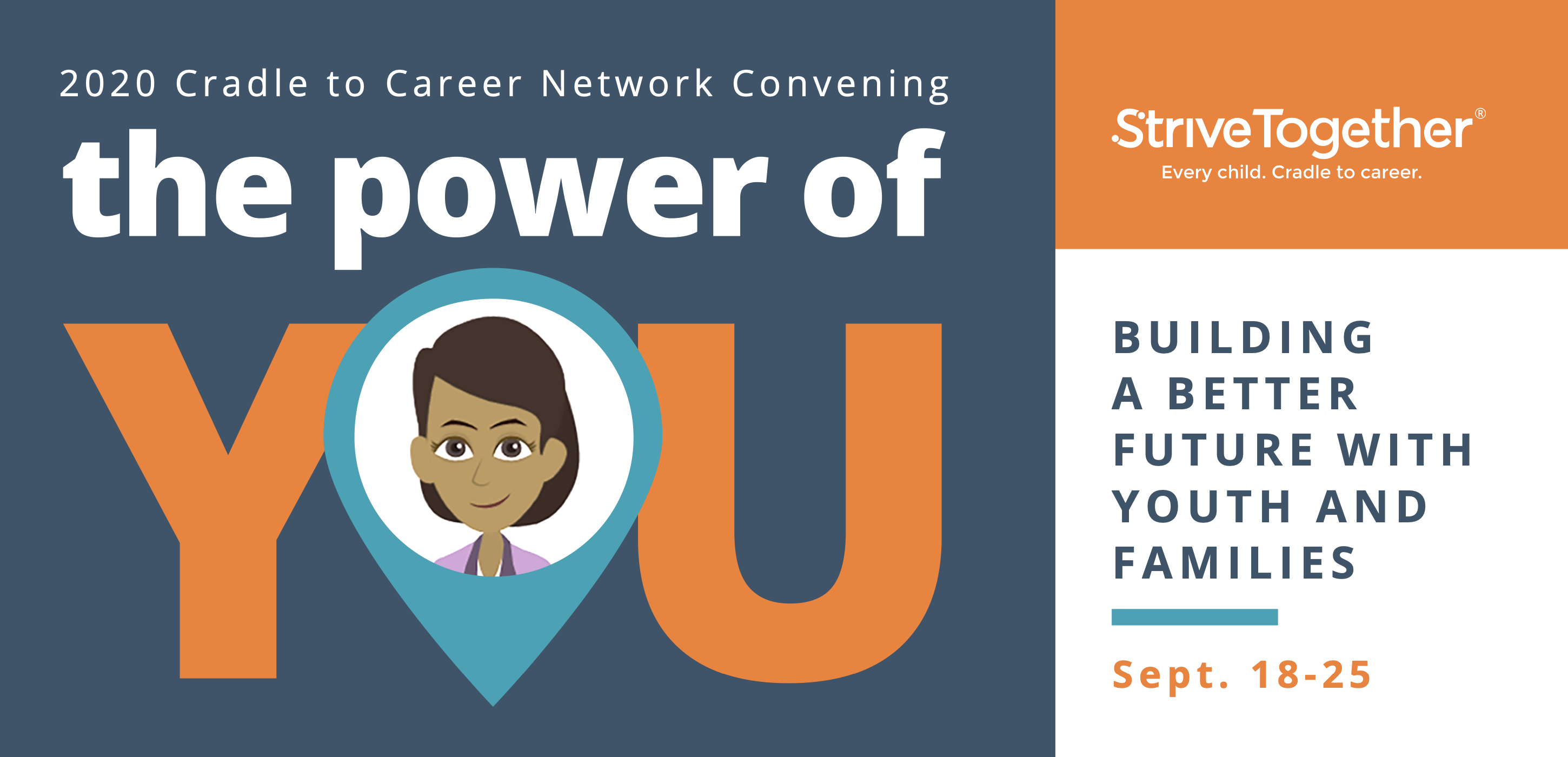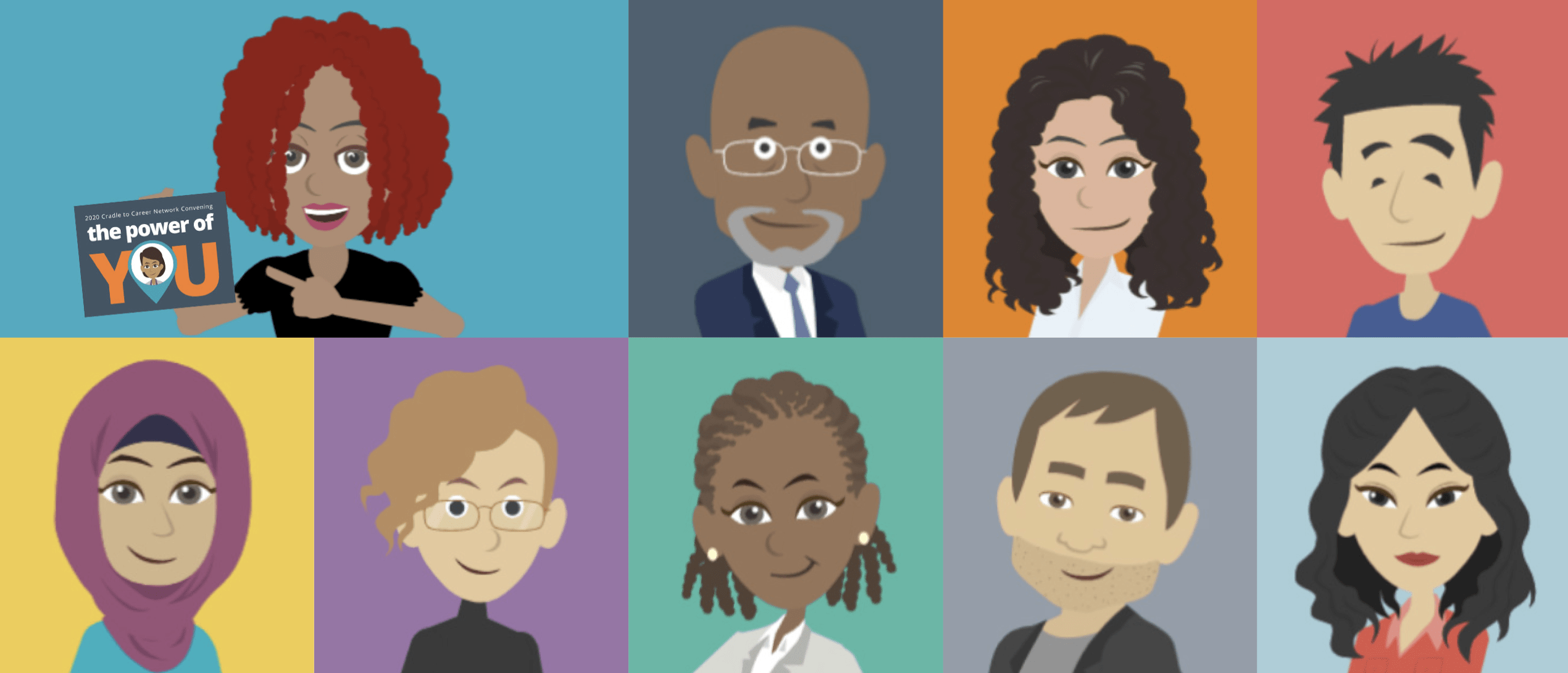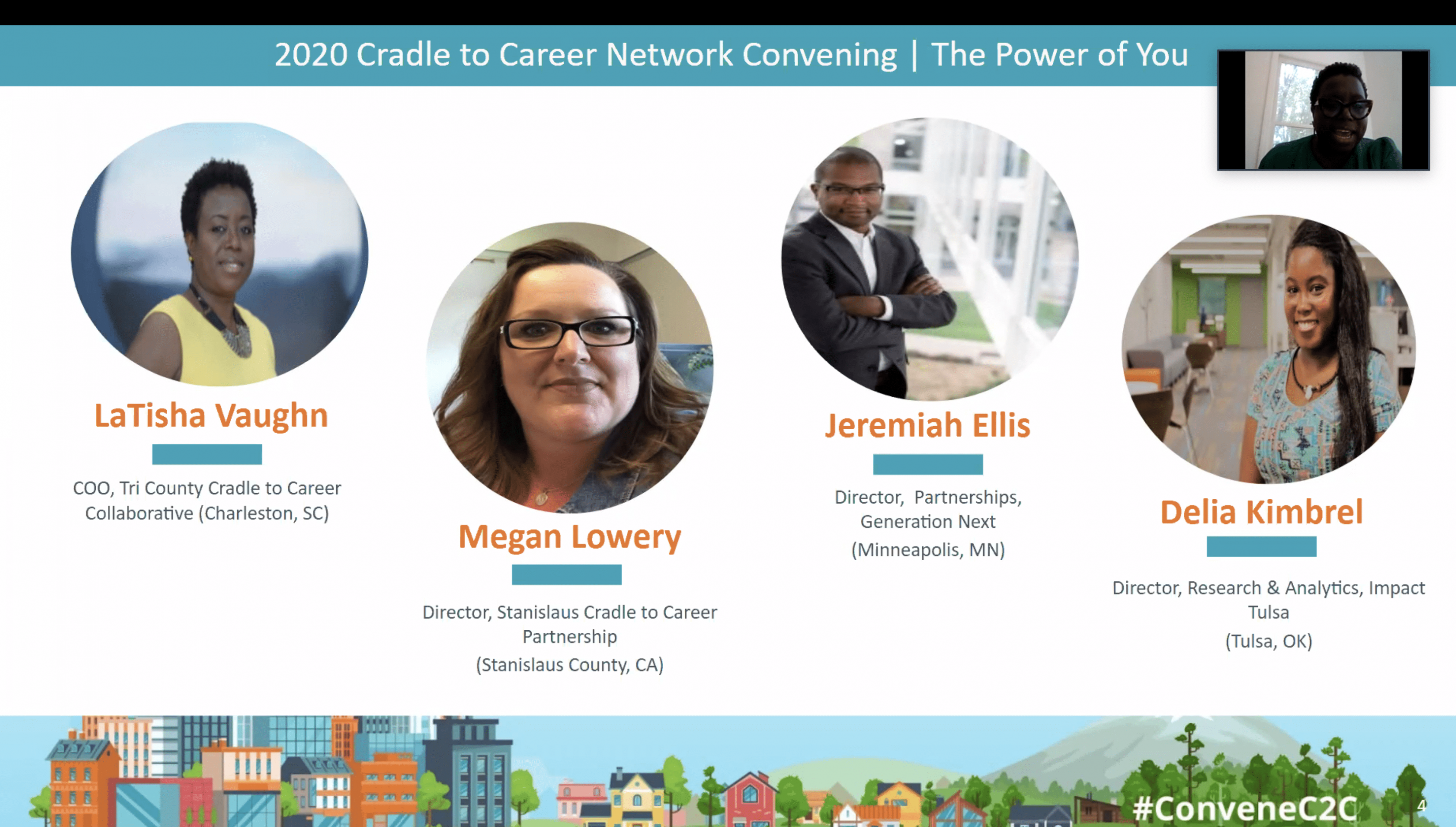StriveTogether 2020 Cradle to Career Network Convening Recap

This year, StriveTogether hosted their first ever all-virtual Cradle to Career Network Convening from September 18-25, 2020.
Forward Friday, September 18, began with a kick-off keynote speech from Geoffrey Canada and StriveTogether CEO Jennifer Blatz. Canada is the founder and president of the Harlem Children’s Zone, and encouraged Convening attendees to “have the courage to take on some unfinished work in this country” in regards to equity.
Canada urged attendees to start their work by looking at the data, and to be honest about what is working and what is not working. He also encouraged changemakers to not be afraid to ask for help in their communities.
“If we’re not prepared to take some risks and do some innovative things, then our families are not going to make it,” Canada said.
To read the blog post about Geoffrey Canada’s speech, click HERE.
Together Tuesday, September 22, featured three sessions led by Generation Next and other Minnesota Education Partnerships Coalition (EPC) members (in bold):
- Racial justice embedded at every level of the organization
Cradle 2 Career (Rochester, MN), Eastside Pathways (East King County, WA), ROC the Future (Rochester, NY) - Grassroots leadership and community engagement
Greater Dalton Education Partnership (GA), Generation Next (Minneapolis & St. Paul, MN) - Collective impact and equity in rural communities
Austin Aspires (Austin, MN), imPACT East Idaho
Julie Brock, Executive Director of Cradle 2 Career, said:
“It is so affirming to be among colleagues and peers from across the nation who are fighting for the same systemic changes we are. My favorite session was around a racial equity data index. It is a way to bring the educational inequities out front for our entire community to acknowledge and work collectively to change.”
In Generation Next’s portion of the “Grassroots Leadership and Community Engagement” session along with the Greater Dalton Education Partnership, Generation Next asked the following questions to network members to facilitate a discussion about possible solutions:
- How do we spread, broaden, and deepen effective place-based efforts?
- How might we start with what is needed at the neighborhood level and feed those needs up to regional or statewide systems?
- How might we ensure that systems leaders are focused on priorities of communities that they have not served well?
- How might we know which communities haven’t been served well and what priorities they hold?
The insight from network members regarding these essential questions was greatly valuable to the staff at Generation Next, and we will be taking the group’s suggestions into consideration as we grow our grassroots leadership and community engagement within the Twin Cities.
Together Tuesday’s afternoon sessions included affinity groups spaces for network members, grouped by race. StriveTogether describes the background of these affinity groups:
“We all have work to do to dismantle and reimagine a just and equitable world for all. However, the work might look different across groups. Caucuses and affinity group spaces give people the space to be and work with individuals who share similar racial, ethnic, gender identities and abilities. This releases groups from the undue burden of educating other communities about their experiences of racism and other inequities. Instead, affinity group spaces enable collective dialogue and learning amongst peers with similar lived experiences and identities while integrating care, community building and relationships into the process.
For people of color, a caucus can serve as a safe space to work with peers to understand and unearth internalized oppression, for healing of racial trauma and to work towards collective liberation. For white people, an affinity group may provide the space and time to work intentionally on understanding white identity and white privilege and to work on being allies, accomplices, and co-conspirators in movements towards collective liberation. Affinity spaces can also be organized to account for intersectionality.”

On Workshop Wednesday, September 23, Generation Next’s Director of Outreach & Partnerships, Jeremiah Ellis, joined the StriveTogether Race and Ethnic Equity Team for their presentation titled “Charting the Path Toward Systems Change.”
This presentation defined Systems Transformation as: “a fundamental and institutionalized shift towards policies, practices, resources, and power structures that support Black, Indigenous, Latinx and Asian youth and families, with the goal of achieving population results.” The group led a discussion around the question of “What can we do now to ensure gaps are closing and systems are transforming for children and youth of color?”
StriveTogether’s solutions to this question include:
A New Education Model for cradle-to-career partnerships, education institutions, partner agencies and adjacent sectors to create a new education model that keeps racial and ethnic equity at the center to drive lasting change to improve outcomes for children of color.
Systems Level Indicators to measure and track progress on systemic structural and institutional level change.

Forward Friday, September 25, was the final day of the 2020 Cradle to Career virtual Convening. The Closing Plenary session was led by Akia Callum, Director of Community Impact at the Waterbury Bridge to Success Community Partnership. Callum interviewed Nikole Hannah-Jones, the final keynote speaker of the Convening. Hannah-Jones is an investigative reporter who was also the creator and lead writer of The 1619 Project.
For Convening attendees, Hannah-Jones offered a reframe of how to fix systems that have disproportionately impacted Black Americans. She encouraged changemakers across the StriveTogether network to know their history.
“You cannot fix systems if you don’t understand how they were architected in the first place,” Hannah-Jones said.
“You can’t just ignore some of the past simply because it was uncomfortable.”
She encouraged attendees to study the history, look at the data, and “draw the very direct lines between what occurred in the past and what happens now.”
“No one worked harder than somebody who was enslaved, and yet they were working in a country where they were not the beneficiaries of that labor,” Hannah-Jones said.
Hannah-Jones offered up the following ways to acknowledge systemic failures that are being seen across the StriveTogether network and across the country, and how to move equity from a buzzword to an action:
- Talk to your school board and tell them to teach our real history.
- Support public education.
- Stop funding schools through property taxes, which exacerbates inequities.
- Collapse schools so real estate is not being used as a way to segregate schools.
To read the full blog post about Nikole Hannah-Jones’s keynote, click HERE.
“Justice is what love looks like in public” – Christian Paige
To close out the entire 2020 Cradle to Career Convening, Christian Paige, a poet, educator, and community advocate, shared a spoken word poem, “Untitled.” Paige says of the poem, “This is a poem I know I didn’t start. This poem is a collection of individuals, but I am proud to add my chapter to this book. This poem has no title, as I was not the first person to write it.”
To hear the entire spoken word by Christian Paige, click HERE.
The Generation Next team greatly enjoyed this year’s all virtual 2020 Cradle to Career Convening. We look forward to meeting next year with other StriveTogether communities to continue our work of closing the achievement gap.
